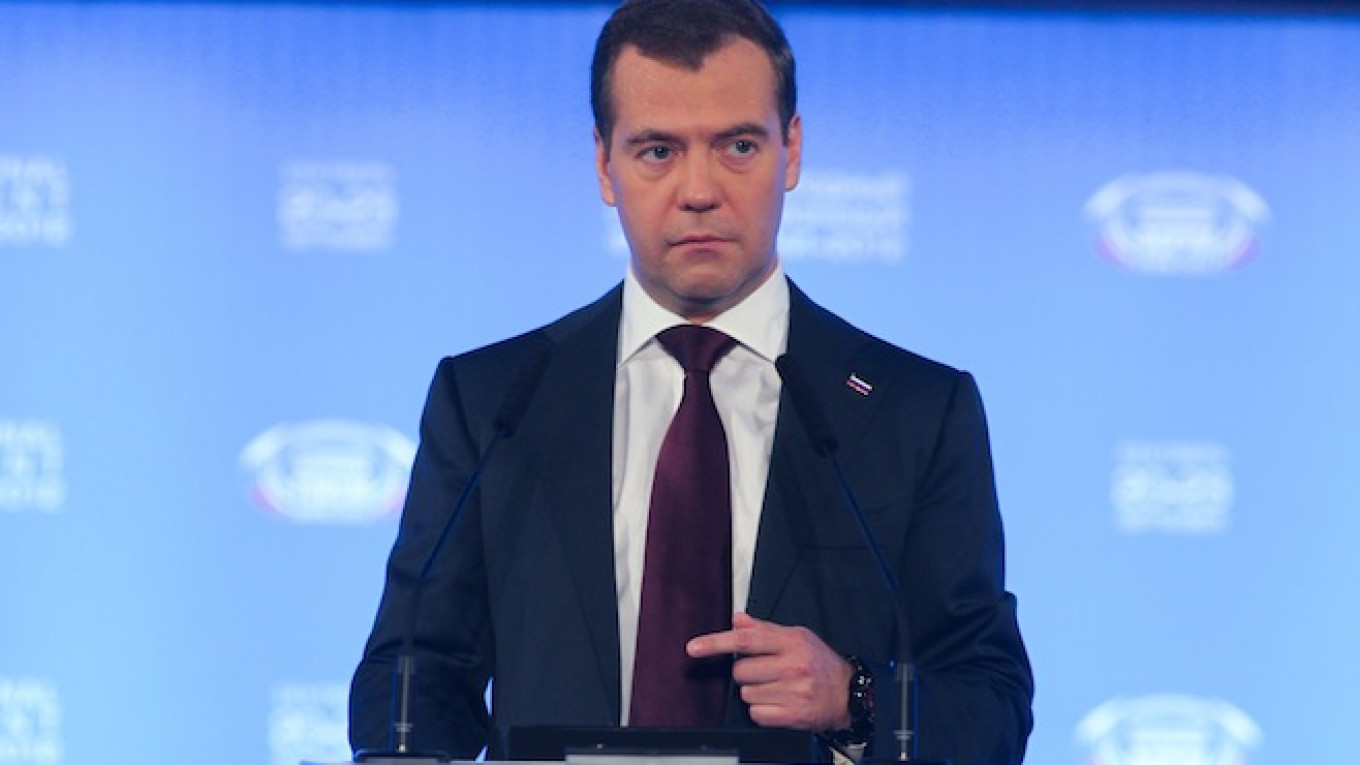Unpredictable lawmaking is undermining Russia's ability to attract foreign investors, the Foreign Investment Advisory Council (FIAC) — a group of the biggest foreign companies working in Russia — told Prime Minister Dmitry Medvedev on Monday.
A report by financial services group and FIAC member EY (Ernst & Young) into the group's attitudes published before the meeting welcomed progress in some areas of regulation, but said 77 percent of firms were unhappy with the unpredictability of legislative changes.
According to a document for the meeting cited by the Vedomosti business daily on Monday, foreign companies complained that the government was making unexpected decisions — like new waste disposal rules and measures to incentivize local production — without calculating side effects. Such decisions cost consumer goods makers 1.5 billion euros ($1.7 billion) last year alone, Vedomosti said.
The government has become increasingly preoccupied with “economic sovereignty” following the crisis in Ukraine last year and resulting economic sanctions. The replacement of foreign goods and services with local production has become a key priority, and is a rising topic among foreign investors, Alexander Ivlev, a managing partner at EY Russia who attended Monday's meeting, said in written comments.
EY's report gave a list of negative regulatory changes over the past year, including a law requiring companies to store data in Russia and bans on a range of food imports. One example, a law restricting media ownership by foreign companies to 20 percent, zipped through three sessions of parliament within 10 days of its appearance last fall, and has forced foreign companies including Hearst and Axel Springer to restructure or withdraw from Russia's media market.
The warning by members of FIAC came as overseas investors increasingly question whether Russia is an attractive place to do business amid a deep recession.
Sanctions and counter-sanctions between Moscow and the West following the Ukraine crisis last year and a plunge in oil prices have propelled Russian inflation, weakened the ruble, limited access to debt financing, raised interest rates and curtailed trade with other countries.
Against that backdrop, net foreign direct investment into Russia in the year to July 1 was $2.6 billion: its lowest since 2006, according to Central Bank data.
Set up in 1994 as a forum for foreign business to communicate with senior officials, FIAC has 51 member companies, of which 49 hail from Europe, North America and Japan.
Opening Monday's meeting, Medvedev struck a positive tone, saying that the combined investment in Russia of all the countries represented by member firms was $130 billion. “And it is rising, despite our current problems,” he added.
He pointed to the new opportunities presented by the Eurasian Economic Union, which came into force this year and unites five former Soviet countries — Russia, Kazakhstan, Belarus, Kyrgyzstan and Armenia — offering easier access to those markets.
But sentiment among member companies was not so rosy.
“Traditional concerns that include unstable regulation and red tape have been aggravated by the unfavorable economic developments, reduced attractiveness of the Russian market, the too complicated business environment and uncertainly over the sustainability of economic measures taken by the government,” the EY report read.
EY said that FIAC members — companies like Carlsberg, BP, Siemens and Ford that are among the oldest and largest investors in Russia — were unlikely to pull back from the country.
But they may not be willing to endure a downturn for ever. Global Counsel, a Britain-based advisory group, told The Financial Times on Monday that some of the biggest foreign investors in Russia could curtail their activities in the country if economic conditions did not stabilize during the coming 18 months.
According to Global Counsel, which analyzed the financial statements of 46 multinational groups working in Russia, the most pessimistic were banks and oil and gas firms, while health care companies were more confident. The financial and energy sectors have been targeted by Western sanctions on Russia and directly hit by the fall in the oil price and parallel devaluation of the ruble.
Russia's economy is expected to contract by around 4 percent this year, and the decline is expected to continue well into next year.
Contact the author at p.hobson@imedia.ru
A Message from The Moscow Times:
Dear readers,
We are facing unprecedented challenges. Russia's Prosecutor General's Office has designated The Moscow Times as an "undesirable" organization, criminalizing our work and putting our staff at risk of prosecution. This follows our earlier unjust labeling as a "foreign agent."
These actions are direct attempts to silence independent journalism in Russia. The authorities claim our work "discredits the decisions of the Russian leadership." We see things differently: we strive to provide accurate, unbiased reporting on Russia.
We, the journalists of The Moscow Times, refuse to be silenced. But to continue our work, we need your help.
Your support, no matter how small, makes a world of difference. If you can, please support us monthly starting from just $2. It's quick to set up, and every contribution makes a significant impact.
By supporting The Moscow Times, you're defending open, independent journalism in the face of repression. Thank you for standing with us.
Remind me later.






